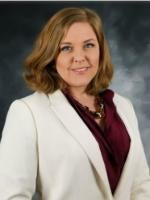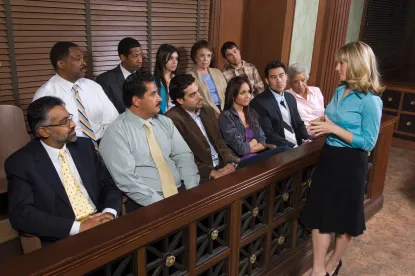Dr. Christina Marinakis discusses the importance of designing jury research projects to align with overall case goals, the advantages and disadvantages of pandemic-era virtual hearings, and the impact of mentorship in the legal industry. Listen above or read the interview transcript below. (Part 2 of 2; Originally recorded July 2021)
Hello and welcome to the IMS Insights Podcast. Today, we’re speaking with IMS jury consultant and strategy advisor Dr. Christina Marinakis about jury research goals, lessons learned from COVID-19, and the impact of mentors. Dr. Marinakis has over 20 years of experience in jury research, jury study, and applied practice in law and psychology. In addition to analyzing jurors, Dr. Marinakis regularly assists counsel in developing and implementing trial themes throughout voir dire, opening statements, and witness testimony—evaluating thousands of mock jurors through focus groups, mock trials, shadow juries, and post-verdict interviews.
Teresa Barber:
I wanted to ask you, too, jury research. So we’re talking about voir dire, but as we go into just understanding the venue, understanding the community, the likely jurors, there are a lot of options right now out for trial teams, for litigators to be prepared. What should they look for? What should they be thinking about?
Dr. Marinakis:
Well, it’s important to develop your goals from the start because your goals are going to drive the research design. So if you are early in the litigation process, and your goal is to develop some themes because you want your witnesses to incorporate those themes in their deposition testimony, then the research early on is going to more look like a focus group because the best themes come from jurors’ mouths themselves, right? If you want jurors to repeat something, best to start with what some of the jurors have already said, and when we do focus groups, we listen for catchy phrases that jurors bring up or phrases that other jurors latch onto and say, “Oh yeah. I agree with that.” Or that convinces other jurors to change their minds. And that’s how we develop themes to then test in later litigation. It can also help guide discovery by conducting early research to learn what is the information that jurors want to know, what would be important to them?
Dr. Marinakis:
A lot of times, our clients are surprised at the things that jurors find important. And sometimes, you just don’t have the evidence to support what they think is important or to quash something that they…a misconception that they have. So learning early on what jurors think about the case and what information they think is important will help you as you prepare your case for trial. Now, if you’re closer to trial, and your goal is really, well, let’s see how these witnesses play, and maybe we need to do additional prep with our witnesses. Then we would recommend some sort of maybe a mock trial, where you have an opportunity for the mock jurors to view witness clips and give their evaluations of the witness. And then, you can take that feedback and then work with your witnesses to prepare them on improving their communication or their testimony for trial.
Dr. Marinakis:
And then you also have, what is your goal in terms of testing the case? Is it to test your themes, or are you hoping to receive a potential exposure to damages? If the latter, if damages are something you really want to test, you need to have a larger sample size. A focus group will not be sufficient to get a large enough sample size to give reliable data about damages. And more likely, you’re able to get a range of damages or to learn what are the factors that are driving damages, but you’re not going to be able to predict what the case value is with a small group of jurors.
Dr. Marinakis:
So the other aspect is certainly time, where you are in the process will dictate what type of research you do and budgetary constraints. I mean, that’s a reality of litigation. Not every client can afford to do a five-jury mock trial. So you have to just keep those caveats in mind, and you can still do research that would be beneficial but know the limitations of those research when you’re communicating with your client. We can do this, this, and this within your budget. And here’s what we’re going to learn from that. And here’s what we won’t learn. So we want to be forthright with our clients and what research can and can’t achieve.
Teresa Barber:
I wanted to talk, there’s quite a bit of discussion and has been on COVID-19 and the pandemic, and what we’ve seen in litigation and legal industry at the very least post-pandemic has been just disruption and change, and we’ve even seen remote jury trials, and then I’ll say, there’s also been a little bit of discussion about how much of this is going to be sticking. Do you see any lessons from the past year, year and a half, that we’ve been seeing a rise in virtual trials, a rise in virtual hearings, virtual depositions, and arbitrations? Are there any lessons that the litigation community really needs to be thinking about translating over, whether it’s sustaining in the virtual platform or taking some of those lessons that we’ve seen from the virtual environment and translating them into the mortar courthouse?
Dr. Marinakis:
Yeah. I think the big lesson is just where there’s the will, there’s a way. And we have found a way to keep things moving despite limitations. The court system generally has been slow to develop technology, slow to adapt to technology as opposed to other industries. And this has really forced judges to consider using technology to make the process easier, whereas they didn’t have that motivation to do that before. People were really stuck in the status quo. It works as it is, why change things. And now we see more and more judges who are willing to step out of their comfort zone and do things like electronic questionnaires. And what we found is that most of the time, the judges and the jurors have a really good experience with that because instead of sitting inside of a courtroom, packed with a hundred other people, trying to write something down on your lap on a tiny little notepad, jurors can fill out the questionnaires from the comfort of their own homes.
Dr. Marinakis:
And we’re getting more robust information that way, the parties have more time to review the information, which makes them more prepared for voir dire, and the process just goes much smoother with this electronic questionnaire. So my hope is that more and more judges will be willing to continue the electronic questionnaire process, even after things resume to normal. As far as the virtual hearings go, I think that’s also something that people are finding are just more efficient for everyone’s time. If something can be achieved via a Zoom hearing, then why not? It certainly makes things a lot easier for everyone involved, the court and the parties, and makes for scheduling a lot easier for attorneys who may have to appear in different courthouses throughout the day. But there’s other things that I think will go back to normal. I don’t see us sticking with Zoom trials because there are challenges to Zoom trials, challenges with witnesses who are appearing by Zoom with connectivity issues, with audio issues, and with jurors not feeling like they can connect with the witnesses or the plaintiffs or representatives while being distant.
Dr. Marinakis:
We also see some effects in deliberations where in a virtual format, the jurors, they have less camaraderie, and they’re less willing to compromise because they haven’t spent time with each other. And so we’re seeing that we have more hung juries in the virtual format than we do in person. And that could be good or bad depending on where you’re coming in the case, but there is a difference. And I think judges recognize that and will want to go back to be in person. But what’s important to know is that humans are incredibly adaptive. And so, following a traumatic event, everyone eventually returns to the mean. It goes the other way as well, following an incredibly joyful event, winning the lottery. For instance, it might be a very happy moment at the time, but most people still go back to their mean. If you were an unhappy person, you’re eventually going to go back to being an unhappy person.
Dr. Marinakis:
And that’s the law in psychology, that’s known as the law of habituation, and that’s where emotional events, whether it’s positive or negative, they tend to wear off over time and lose their vibrancy; that fades. And that’s what is happening here too. We saw changes in attitudes in jurors at the start of the pandemic. Last summer, there were certainly differences in how jurors viewed corporations, for example, how they view monetary damages, but more and more, we’re seeing things revert back to the mean. And so, while we saw those initial shifts, it’s really unlikely that the pandemic will result in any major changes over time. And so jurors who would be attentive in person, are attentive on Zoom, jurors who are inattentive in person would be inattentive. And it’s really more about their innate selves than it is about the situation, because you ultimately go back to who you are innately.
Teresa Barber:
Yeah. Interesting, back to the baseline.
Dr. Marinakis:
Mm-hmm. Exactly. Yeah. Everyone’s, and that’s not the answer a lot of people want to hear and people are so interested in learning how’s the pandemic going to change things, and the truth is it just like everything in our lives events really tend to not change things quite so much as you would think they would.
Teresa Barber
Yeah. A little counterintuitive, but very interesting. And it makes sense. Christina, I wanted to talk to you a little bit about mentors. Mentoring’s become increasingly and continues to be increasingly important among law firms and a lot of careers throughout the sciences, engineering, and what we’ve seen, too, with a lot of our client firms and throughout the industry, is mentoring playing a critical role in securing and retaining talent and even people just navigating into that career that bright young individual graduating from high school, finding out where they want to go, what that North Star is going to be for their life and their career. Have you had any mentors in your life, or would you say that mentorship has played any kind of significant role for you?
Dr. Marinakis:
Oh, absolutely. And I think to comment on your first message is how important it is. There are several models of consulting firms, where you have an individual who has the set of clients, and they have associates that do the work, but they’re always the one that’s client-facing. And that’s just not sustainable for the overall life of the business. In order to grow the business, you need to have the clients have developed relationships with the other folks at the firm. And so they can start to gain their own clients and be able to sustain the business beyond that one person who’s generating.
Dr. Marinakis:
And so also people want to feel like they are contributing, and they want to feel like they have an important role. And we see this, especially with millennials and that group of folks who want to come right out of school and want to be in the courtroom and doing something meaningful. And if they don’t have that meaning-ness to their occupation, they will leave, and they will seek meaning elsewhere and will jump from job to job simply because they want that excitement. They want to feel like they’re making a difference.
Teresa Barber:
That purpose.
Dr. Marinakis:
And just being the worker, yeah. Being the worker bee is not going to get them there. And so, giving them opportunities to interface with the client is important. And that’s where mentoring comes in play. You can’t just put these folks right in front of your clients right away on their own. Instead, having them listen in on calls. For example, shadowing, as you attend meetings and having them weigh in on things. I know within our firm, that’s something that we really value. And when we have our associate consultants in the meeting, send us an email if you have a thought, a feedback that you want to say, and then we can talk kind of go through the email to say, that’s a great thing, bring that up. And it gets our younger folks interested in speaking up in the meeting and starts to build their confidence.
Dr. Marinakis:
Now and for me personally, having Merrie Jo Pitera was an incredible mentoring opportunity for us. She encourages everyone to be into their own, encourages people to speak at conferences, and will give us the resources to enable us to do that, to be able to do sponsorships so that we can speak of those things and build our clientele and build our name in the business and write blogs, give us time to do those things is certainly important to help us build our client base.
Teresa Barber:
Dr. Marinakis, thank you so much for taking the time to come and share your thoughts and share your expertise with us and with our listeners today.
Dr. Marinakis:
Of course. It’s great chatting with you.
Teresa Barber:
Great. Well, and hopefully ll have you back again soon.
Dr. Marinakis:
Looking forward to it.






 />i
/>i
